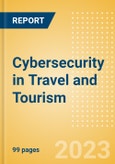This thematic research report takes an in-depth look at the theme of cybersecurity and the impact it has on the travel and tourism industry. This report analyzes the players impacted by this theme alongside the contributing trends, negative destination trends, unintended opportunities, and trends that have emerged as a result of cybersecurity. It then dives deep into an industry analysis, presenting several real-life case studies looking at how destinations and companies have responded to the impact of this theme on their operations. Recommendations are then offered for the travel sector, alongside a description of companies mentioned throughout.
Who should buy?
CEOs, Senior Executives, and Marketing Executives within travel and tourism should use this report to understand the highly important theme of Cybersecurity.
Key Highlights
The travel and tourism sector is one of the most susceptible to cyberattacks, ranking third in incidents according to the Trustwave 2020 Global Security Report. With attacks becoming more common and increasingly sophisticated, the risk and impact of cyber-ignorance are escalating. The different layers of the travel and tourism value chain handle vast amounts of personal data and involve numerous individuals susceptible to human error, interacting with millions of customers in cyberspace. Therefore, given the growing sophistication of attacks, simply thoroughly investigating cybersecurity strategies in the aftermath of a cyberattack or focusing on meeting compliance obligations will not suffice, it will only lead to an endless cycle of spending.Cybersecurity should involve contingency planning, outlining the immediate actions and post-breach responses a company should take if a cyberattack occurs, and understanding a company's current level of cyber risk. Although these services are typically outsourced, companies should still invest in these services by creating strong partnerships with service providers to stay on top of vulnerabilities and ensure compliance requirements are met. This is especially important due to the volume of sensitive data these companies handle, especially direct suppliers. Managed security services, risk and compliance services, and post-breach responses will limit attacks and help companies respond effectively to retrieve personal data, minimizing damage to consumers. This is important as the industry has experienced a string of high-profile cyberattacks which have caused significant reputational damage.
Changing travel restrictions because of COVID-19 has made a seamless booking experience increasingly expected. These are often facilitated by OTAs, allowing for changing travel arrangements and ease when booking online. Online travel booking is accelerating and is an attractive area for cybercriminals. As booking becomes more digitalized and more personal data is shared online, the exposure to security threats increases. Mobile travel apps are also common platforms for OTAs, but they have become popular endpoint targets among threat actors.
Scope
- This thematic report provides an overview of the impact cybersecurity has on the travel sector and seeks to understand some of the contributory factors
- The key trends within this theme are split into three categories: technology trends, macroeconomic trends, and regulatory trends
- Several case studies are included to analyze the multiple ways countries and companies have responded to the impact of this theme's growth and what they are doing to grow with this theme
Reasons to Buy
- Understand the current cybersecurity trends within the travel landscape today and how these will escalate in the near future
- Assess how travel and tourism companies such as tour operators, OTAs and DMOs are utilizing cybersecurity to drive revenues
- Acknowledge the necessity of using cybersecurity by understanding the social, cultural, and environmental effects on the destination
- Discover recommendations for businesses involved in cybersecurity
- the publisher's thematic research ecosystem is a single, integrated global research platform that provides an easy-to-use framework for tracking all themes across all companies in all sectors. It has a proven track record of identifying the important themes early, enabling companies to make the right investments ahead of the competition, and secure that all-important competitive advantage
- All across the travel and tourism supply chain, now have an opportunity to capitalize on cybersecurity, and there are notable examples of this. Therefore, all should buy this report to fully understand how this theme will continue to be a key theme in the future travel landscape.
Table of Contents
- Executive Summary
- Players
- Technology Briefing
- Threat actors
- Types of cyberattack
- Stages of an attack
- Trends
- Technology trends
- Macroeconomic trends
- Regulatory trends
- Travel & Tourism Challenges
- The Impact of Cybersecurity on Travel & Tourism
- Case Studies
- MGM Resorts
- Disneyland California
- H-Hotels
- IHG
- AirAsia
- Industry Analysis
- Market size and growth forecasts
- Cybersecurity products and services
- Timeline
- Signals
- M&A trends
- Venture financing trends
- Patent trends
- Company filing trends
- Hiring trends
- Social media trends
- Value Chain
- Cybersecurity hardware
- Cybersecurity software
- Cybersecurity services
- Companies
- Leading cybersecurity adopters in travel and tourism
- Leading cybersecurity vendors
- Specialist cybersecurity vendors in travel and tourism
- Sector Scorecards
- Airlines sector scorecard
- Lodging sector scorecard
- Rail and road transport sector scorecard
- Glossary
- Further Reading
- Our Thematic Research Methodology
- About the Publisher
- Contact the Publisher
Companies Mentioned (Partial List)
A selection of companies mentioned in this report includes, but is not limited to:
- Cybereason
- Code42
- ForgeRock
- Illumio
- LogRhythm
- Lookout
- Netskope
- OneTrust
- Socure
- Snyk
- Tanium
- Accenture
- Alphabet
- Check point Software
- Cisco
- Cloudflare
- Crowdstrike
- Darktrace
- Dell Technologies
- Fortinet
- IBM
- Microsoft
- Palantir Technologies
- Palo Alto Networks
- Rapid7
- Splunk
- Tenable
- Trellix
- Zscaler
- Ekran System
- F-Secure
- VigiTrust
- ITSEC Group
- TitanHQ
- Airbnb
- Booking Holdings
- Despegar.com Corp
- easyJet
- Expedia Group
- Hilton
- Hyatt
- Lastminute.com
- MakeMyTrip
- Marriott International
- TUI
- Uber
- MTR Corp
- Central Japan Railway Company
- East Japan Railway Company
- Lyft
- TripIt








